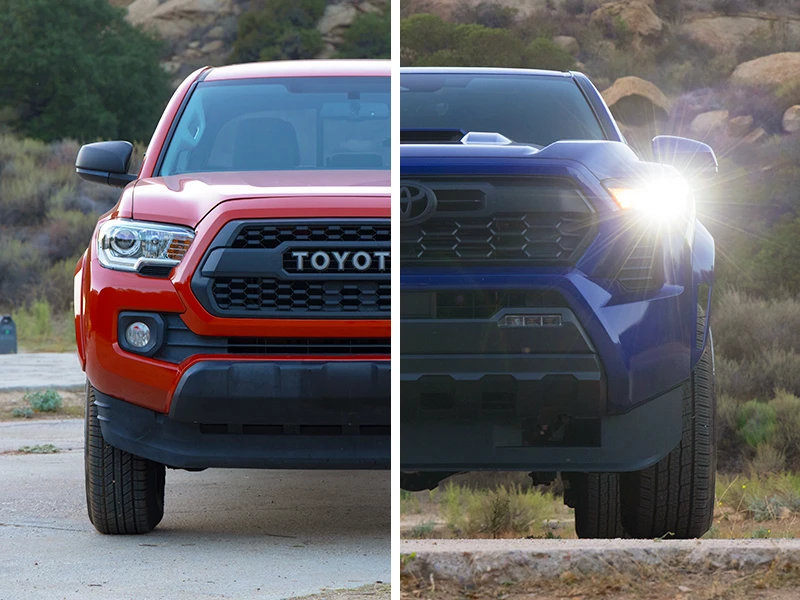Electric hatchbacks to go the distance.
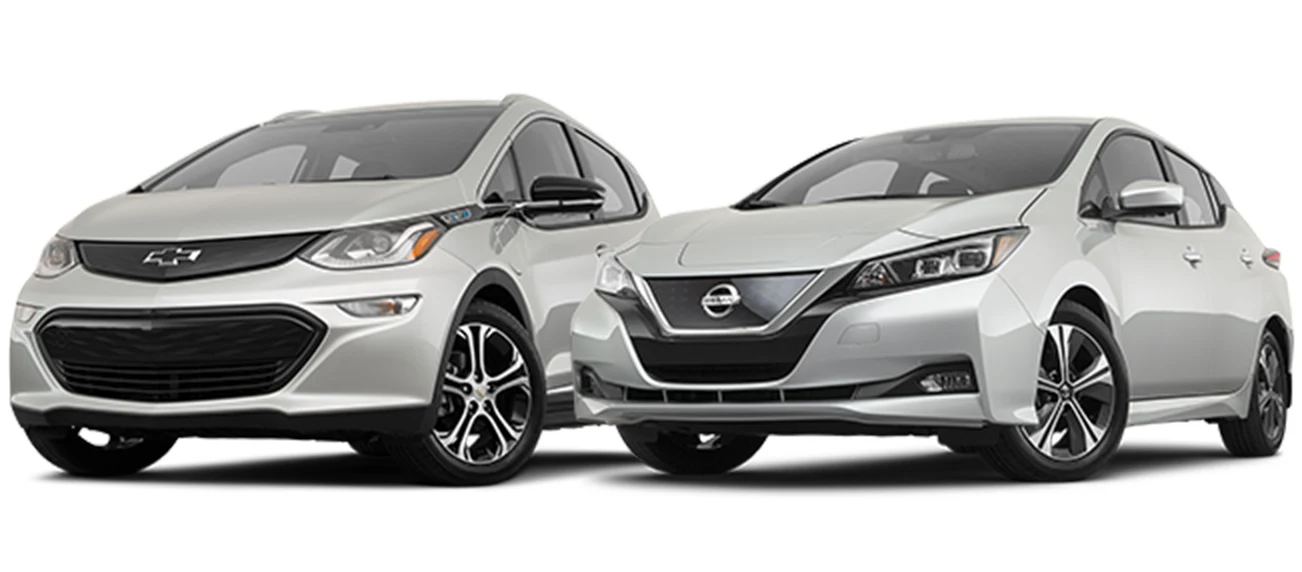
If you're looking for a compact, easy-to-park electric car, you might find yourself considering the Chevrolet Bolt or Nissan Leaf. Both are all-electric hatchbacks that are great for city drivers but also have a range that can support commuters. The hatchback option gives you flexibility when it comes to cargo space, which is ideal if you have children or are a sports enthusiast who travels with equipment.
There are more expert reviews around CarMax like this one. Here are some you’ll want to check out:
Wondering which electric vehicle is right for you? Learn more in this comparison of the Chevrolet Bolt vs. Nissan Leaf.
Side-by-Side Comparison

2019 Chevrolet Bolt | 2019 Nissan Leaf | |
|---|---|---|
Average Price | Less than $21,500 | Less than $21,500 |
Performance | ||
Base Motor | Electric motor powered by a 60 kWh battery | Electric motor powered by a 40 kWh lithium-ion battery |
Horsepower | 200 hp | 147 hp |
MPGe | EPA-estimated 119 MPGe | EPA-estimated 112 MPGe |
Interior | ||
Seating | 5 | 5 |
Cargo Space | 16.6 cu ft | 23.6 cu ft |
Front-seat Legroom | 41.6 inches | 42.1 inches |
Rear-seat Legroom | 36.5 inches | 33.5 inches |
Overall Interior Space | 94.4 cu ft | 116 cu ft |
Rating | ||
Tailpipe Emissions | 10 grams per mile | 10 grams per mile |
NHTSA Safety Rating | 5/5 | 5/5 |
Certain vehicles may have unrepaired safety recalls. Click here to look up a specific vehicle.
Features and Trim Options
Both the Chevrolet Bolt and Nissan Leaf are small hatchbacks. They each have five doors and seating for five passengers. Both are all-electric, meaning they must regularly be plugged into a charging station in public or at your home. The Chevrolet Bolt has a 200 hp electric motor across all model years, while the Nissan Leaf has a 147 hp motor on model years 2018-2021, and a 107 hp motor on model years 2017 and earlier.
Chevrolet Bolt
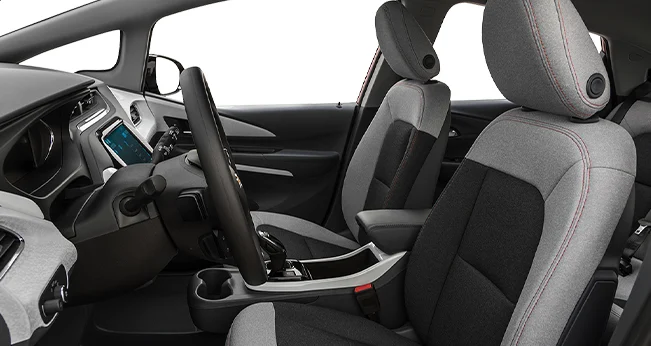
The Chevy Bolt is a great choice if you want a bit more power and many standard tech features. The Bolt, which was introduced in 2017, comes in two trims: LT and Premier. The LT trim comes standard with connectivity features, while the Premier trim offers more driver-assistance features as well as leather seating.
All 2017-2020 Chevrolet Bolts have:
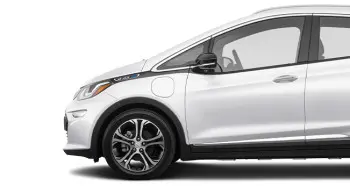
200 hp electric motor
60 kWh lithium-ion rechargeable energy storage system (66 kWh on 2020 models)
Apple CarPlay®, Android Auto™, and Bluetooth® connectivity
Two USB ports
Backup camera
Available lane-departure warning and automatic braking
Keyless entry
Nissan Leaf

The Nissan Leaf was introduced in 2011, and its second generation began with the 2018 model year. The 2018-2020 Leaf comes in three trims: S, SV, and SL. In 2019, Leaf Plus models were introduced.
Here are the standard features you'll find on the 2018-2020 Nissan Leaf:

40 kWh lithium-ion battery (available 62 kWh lithium-ion battery on Plus models from 2019)
Automatic emergency braking
Blind-spot warning, lane-keep assist, and more (standard on SV and SL trims)
Bluetooth integration
Apple CarPlay and Android Auto connectivity (standard on 2020 models)
Heated front and back seats
Powertrain Options
Both the Chevrolet Bolt and Nissan Leaf offer only one motor option each. All Bolt models have a 200 hp electric motor powered by a 60 kWh battery, increasing to 66 kWh for 2020. When fully charged, the 2017-2019 Bolt has an EPA-estimated range of 238 miles (259 miles for 2020).4
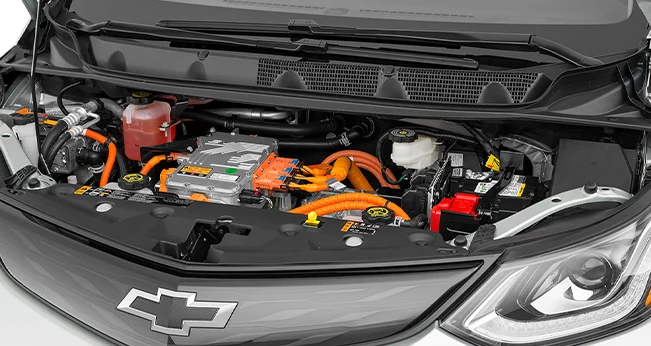
The 2018-2020 Nissan Leaf comes with a 147 hp motor powered by a 40 kWh lithium-ion battery. With this powertrain, the Leaf has an EPA-estimated range of 150 miles on a full charge.4 On model years 2019 and later, you can upgrade to a 62 kWh battery, which increases the range to an EPA-estimated 226 miles on a full charge.4 On model years 2017 and earlier, the Leaf has a 107 hp motor powered by a 30 kWh battery with an EPA-estimated range of 107 miles when fully charged.4

Fuel Economy
The Chevrolet Bolt and Nissan Leaf are good cars if you're looking for something that works with your eco-conscious lifestyle. The 2017-2019 Chevy Bolt with the 200 hp motor and 60kWh battery has an EPA-estimated combined fuel economy of 119 MPGe.††
The 2018-2019 Nissan Leaf with the 147 hp motor and 40 kWh lithium-ion battery has an EPA-estimated combined fuel economy of 112 MPGe.†† With the 62 kWh Leaf Plus battery option, the 2019 model gets an EPA-estimated combined fuel economy of 108 MPGe.††
Tech Features
Both the Chevrolet Bolt and Nissan Leaf have numerous tech connectivity and driver-assistance features. Here's what you can expect from each.
2017-2020 Chevrolet Bolt:
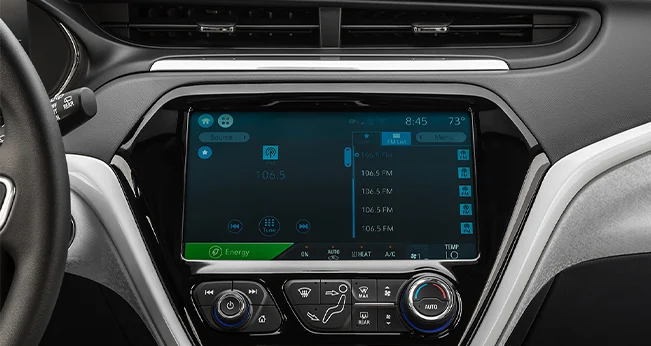
Apple CarPlay and Android Auto connectivity
Bluetooth connectivity
Two USB ports
Available Wi-Fi hotspot3
Eight-inch display screen
Rearview camera
Teen driver technology
Available lane-keep assist, blind-spot monitoring, and rear park assist
2018-2020 Nissan Leaf:

Bluetooth connectivity
One USB port
Seven-inch display screen
Apple CarPlay and Android Auto integration on 2018-2019 SL and SV trims (standard from 2020)
Rearview camera
Intelligent cruise control (SL and SV trims)
Cargo Space
Both of these electric vehicles benefit from a hatchback design, which offers some great cargo space—but the Leaf ultimately offers more room. Both have a 60/40 split-folding back seat, so you can combine passenger space and cargo space.
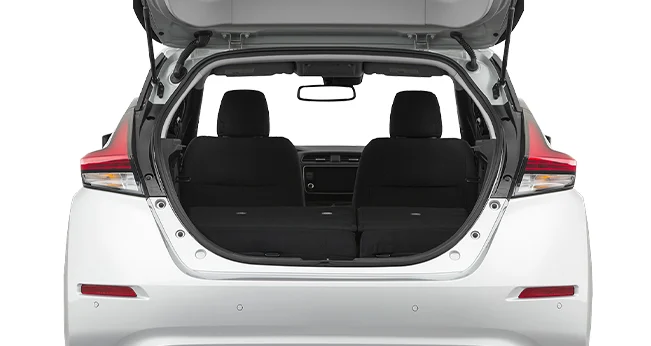
The 2017-2020 Bolt has 16.6 cu ft of cargo space behind the third row, with additional available under-floor cargo space. The 2018-2020 Leaf has 23.6 cu-ft behind the back row.

Pricing
The Chevrolet Bolt has been largely unchanged since it was introduced in 2017. The Leaf, on the other hand, has had two generations, one from 2011-2017 and another that launched in 2018. See below for average CarMax prices for model years of the Chevrolet Bolt and Nissan Leaf.†
Chevrolet Bolt:
2017 - Average prices less than $18,500†
2018 - Average prices less than $20,000†
2019 - Average prices less than $21,500†
2020 - Average prices less than $23,000†
Nissan Leaf:
2017 - Average prices less than $11,000†
2018 - Average prices less than $18,000†
2019 - Average prices less than $21,000†
2020 - Average prices less than $27,000†
Safety Ratings
The 2019 Chevrolet Bolt and 2020 Nissan Leaf both achieved overall five-star safety ratings by the National Highway Traffic Safety Administration (NHTSA). The 2019 Nissan Leaf was not rated. Certain vehicles may have unrepaired safety recalls. Click here to look up a specific vehicle.
Chevrolet Bolt (2019 Hatchback FWD models)
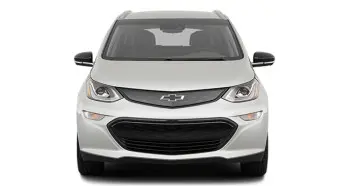
Frontal Barrier Crash Rating Test: A head-on collision between two similar vehicles traveling at 35 mph.
Overall: 4/5
Side Barrier Crash Rating Test: A vehicle standing in an intersection sustains driver-side impact from a vehicle moving at 38.5 mph.
Overall: 5/5
Side Pole Crash Rating Test: A vehicle slides sideways at 20 mph and impacts a tree or telephone pole.
Overall: 5/5
Nissan Leaf (2020 models)

Frontal Barrier Crash Rating Test: A head-on collision between two similar vehicles traveling at 35 mph.
Overall: 4/5
Side Barrier Crash Rating Test: A vehicle standing in an intersection sustains driver-side impact from a vehicle moving at 38.5 mph.
Overall: 5/5
Side Pole Crash Rating Test: A vehicle slides sideways at 20 mph and impacts a tree or telephone pole.
Overall: 5/5
Reliability
RepairPal has not rated the Chevrolet Bolt. RepairPal gave the Nissan Leaf an overall reliability rating of 4 out of 5 stars, which RepairPal describes as above average.
Nissan Leaf
Cost: RepairPal reports that the average total annual cost for repairs and maintenance on a Nissan Leaf is $748, compared to an average of $471 for alternative fuel vehicles and $652 for all the vehicles RepairPal considered in its dataset.
Frequency: According to RepairPal, Nissan Leaf owners bring their vehicles into a repair shop for unscheduled repairs an average of 0.2 times per year, compared to an average of 0.4 times for alternative fuel vehicles and 0.4 times for all the vehicle models RepairPal considered in its dataset.
Severity: RepairPal reported that the probability of a repair being a severe or major issue is 10% for the Nissan Leaf, compared to an average of 9% for alternative fuel vehicles and 12% for all the vehicles RepairPal considered in its dataset.
RepairPal Reliability Ratings are based on the actual cost, frequency, and severity of unscheduled repairs and maintenance on make/model data for select 2010-2019 vehicles. The reliability of a specific vehicle may vary depending on its maintenance and driving history, model year, trim, and features.
*RepairPal Reliability Ratings are provided by RepairPal and CarMax is not responsible for their accuracy. These ratings are based on RepairPal Reliability data as of 12/31/2018. Learn more.
Performance
Both the Chevrolet Bolt and Nissan Leaf benefit from the zippy acceleration of electric vehicles. The 2019 Chevy Bolt with the 200 hp electric motor and 60 kWh battery has an EPA-estimated combined fuel economy of 119 MPGe.†† When fully charged, the 2019 Bolt has an EPA-estimated range of 238 miles.4 With the same 200 hp electric motor and 60kWh battery, the 2019 Chevrolet Bolt can go from zero to 60 in 6.5 seconds and has a top speed of 91 mph (according to the manufacturer, when new).
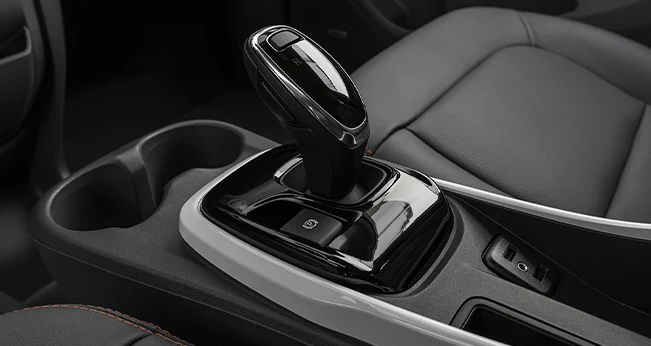
The 2019 Nissan Leaf with the 147 hp motor and 40 kWh lithium-ion battery has an EPA-estimated combined fuel economy of 112 MPGe.†† When fully charged, that powertrain gets an EPA-estimated range of 150 miles.4 With the 62 kWh Leaf Plus battery option, the 2019 model gets an EPA-estimated combined fuel economy of 108 MPGe and has an EPA-estimated 226 miles on a full charge.††,4 With the 62kWh battery option, the 147 hp 2019 Nissan Leaf can go from zero to 60 in 6.5 seconds and has a top speed of 89.5 mph (according to the manufacturer, when new).

Emissions
Both the Chevrolet Bolt and Nissan Leaf have fewer tailpipe emissions than cars with internal combustion engines. According to EPA estimates, the 2019 Chevy Bolt's tailpipe greenhouse gas emissions are 10 grams per mile. According to EPA estimates, the 2019 Nissan Leaf's tailpipe greenhouse gas emissions are 10 grams per mile, with either the standard 40 kWh battery or increased 62 kWh battery that comes on Leaf Plus models.
These estimates are based on a brand-new model. Visit fueleconomy.gov for more details.
The Bottom Line
If you're looking for an electric hatchback, both the Chevrolet Bolt and Nissan Leaf are good options. The Bolt comes with a longer range and more standard tech features, such as Apple CarPlay and Android Auto integration, which makes it a standout for people who have longer commutes. The Nissan Leaf has more cargo space, making it appealing to parents, musicians, and others who regularly transport lots of gear.
Looking to learn more? Check out these related articles:
